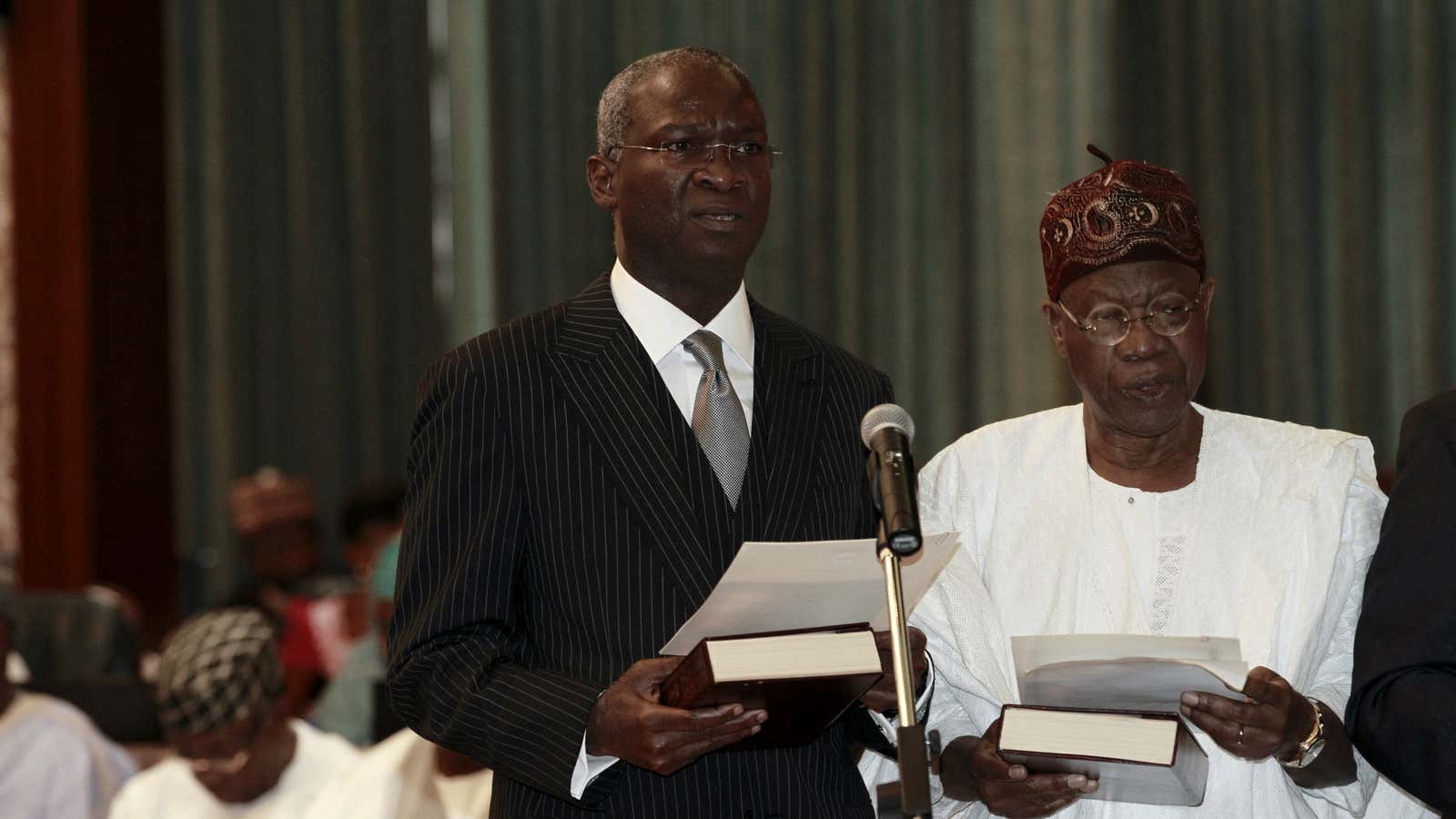In the end, the wait lasted 166 days, but Nigeria finally has a full government cabinet after president Muhammadu Buhari swore in thirty-six ministers on Wednesday (Nov. 11) in Abuja. The nominated ministers had been announced last month as they underwent screening at the Senate but in an elaborate ceremony that lasted two hours, the new ministers were assigned portfolios.
Buhari had taken much longer than expected before making any ministerial appointments as he did background checks to ensure his first cabinet would reflect his central message of “change” and integrity. While not every appointment is a new face or completely without blemish, the new cabinet would be welcomed by investors and local businesses worried much of the economy had been put on hold for some five months while waiting for the appointments.
After the assignment of portfolios, former governor of Lagos, Babatunde Fashola stood out as he was named the minister of power, works and housing—key sectors in the Nigerian economy. Fashola has been tasked with fixing a power sector that has perennially proved difficult to handle. In 16 years, Nigeria has set aside $13.5 billion in budgetary provisions for the power sector but still generates nowhere near enough the required amounts of electricity as millions still live without power. Fashola will also oversee the administration’s goal of reducing Nigeria’s worrisome infrastructure deficit.
Fashola’s assignment, which combines two key ministries, suggests that he will be one of the most important members of Buhari’s cabinet and while it represents an immense challenge, it also presents a great opportunity for Fashola to cement his reputation as one of the country’s leading political players. It also puts him in a strong position as a potential successor to president Buhari following his impressive eight-year stint in charge of Nigeria’s most populous and important city.
Controversial former governor of oil-rich Rivers State, Rotimi Amaechi was named Minister of Transportation despite strong opposition from some senators given the allegations of corruption he has faced in the recent past.
Kemi Adeosun, a former state commissioner of finance, has been assigned the same portfolio at federal level filling the boots of the high-profile Ngozi Okonjo-Iweala, she’s also one of just six women in Buhari’s 36-person cabinet. She’ll play a vital role in bringing stability to an economy that has been hit by the global dip in oil prices as GDP growth slowed this year.
As expected, Buhari will lead the ministry of petroleum while Kachikwu Ibe will serve as state minister of petroleum. It is unclear how this will affect Ibe’s current role as boss of state oil firm, NNPC.
Buhari has also reduced the number of ministries to 25 in line with his promise to run a leaner government. The announcement of the cabinet is expected to stimulate activity in the country after months of uncertainty and inertia which led to questions about the country’s lack of direction.
Full list of ministers and assigned portfolios
Abubakar Malami – Justice
Geoffrey Onyeama – Foreign Affairs
Khadija Ibrahim – State (foreign affairs)
Mamman Ali – Defence
Adamu Adamu – Education
Anthony Onwuka – State (education)
Kemi Adeosun – Finance
Okechukwu Enelamah – Industry, Trade and Investment
Aisha Abubakar – State (Industry, Trade and Investment)
Chris Ngige – Labour and Employment
James Ocholi – State (Labour and Employment)
Mohammed Bello – FCT
Ogbonnaya Onu – Science and Tech
Kayode Fayemi – Solid Minerals
Abubakar Bwari – State (Solid Minerals)
Abdulrahman Dambazau – Interior
Udoma Udoma – Budget and National Planning
Zainab Ahmad – State (Budget and National Planning)
Ibe Kachikwu – State (Petroleum)
Babatunde Fashola – Power, Works and Housing
Mustapha Baba Shehuri – State (Power, Works and Housing)
Audu Ogbeh – Agriculture and Rural Development
Heineken Lokpobiri – State Agriculture
Chibuike Amaechi – Transportation
Hadi Serika – State (Aviation)
Isaac Adewole – Health
Osagie Ehanire – State Health
Aisha Alhassan – Women Affairs
Usani Uguru Usani – Niger Delta
Claudius Daramola – State Niger Delta
Lai Mohammed – Information
Amina Mohammed – Environment
Ibrahim Jubril – State Environment
Suleiman Adamu – Water Resources
Solomon Dalong – Youth and Sports
